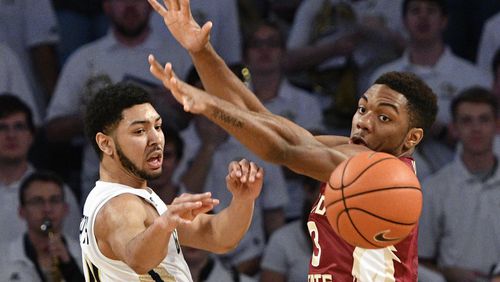Brushed aside a year ago, Georgia Tech point guard Josh Heath has become indispensable. His value to the Yellow Jackets’ cause was stated Wednesday night when Heath was laid out by a bug that drained his minutes and energy.
Without him organizing the team on the floor and handling the ball, the Jackets turned the ball over 17 times, the most in their 10 ACC games, and lost 74-62 at Littlejohn Coliseum. Needing an IV before the game, Heath played 28 minutes, scoring two points with four assists against three turnovers.
“We need him to play well,” Tech assistant coach Darryl LaBarrie said. “We’re a different team when he’s not at full strength, for sure.”
With a more healthy Heath, Tech will try to win Saturday at Wake Forest. He was in a state of recovery Friday, which considerably raises the Jackets’ chances against the Demon Deacons, who are 13-9 overall, 4-6 in the ACC and were No. 32 in RPI going into Friday’s games. (Tech has other health issues. Forward Abdoulaye Gueye likely is out for the season with a wrist injury, and point guard Justin Moore is doubtful for the game with an abdominal injury.)
In the Jackets’ upsets of Florida State and Notre Dame last week, Heath’s contributions were immense, if under the radar. He played 70 out of 80 minutes, handed out 14 assists against four turnovers and totaled seven rebounds. He went scoreless against Florida State, but had nine against the Irish.
“He’s a guy that can have a huge impact on the game without scoring,” LaBarrie said. “Those guys are as valuable as anybody.”
Heath was at his best against Notre Dame, a game that he was more dialed into than any this season, according to LaBarrie. He finished with an impressive stat line — nine points, eight assists and a career-high five steals. Heath was anticipating Notre Dame’s offense, threading passes into the lane and attacking the basket with confidence.
This season, only two other power-conference players have accomplished those standards in a game against a power-conference opponent, according to sports-reference.com. The other two are two of the most celebrated point guards of this season, N.C. State’s Dennis Smith and UCLA’s Lonzo Ball.
“He knew when to be aggressive or when to put the ball in other people’s hands and when to take matters in his own hands,” guard Josh Okogie said. “That’s what I love about Josh Heath — he gives you a chance to succeed while he does his own thing.”
Heath is executing coach Josh Pastner’s directive to be a game manager. Pastner has made the point to observation to Heath and fellow point guards Corey Heyward and Moore that they aren’t good enough to make the big plays. Hit singles, he has told them, and don’t try for home runs. Don’t lose the game.
It’s a role he can play. LaBarrie said that Heath has the highest basketball IQ of any player on the team. He said Heath asks questions of him that reflect a desire to understand not just his role, but what the opponent is schematically trying to do and how best to react to it. At his best, Heath has the look of a player under control and in charge.
“We will miss his IQ in the locker room and on the court next season,” LaBarrie said.
Heath, son of Boston College assistant coach Stan Heath, has taken the game-manager instruction in stride and even embraced it.
“That’s kind of always been my approach,” Heath said. “To hear that (Pastner) is kind of on the same page with me, I guess that helped.”
In the six games preceding the Clemson game — wins over Clemson, N.C. State, Florida State and Notre Dame and losses to Virginia and Virginia Tech — Heath averaged 7 points, 6.7 assists, 2.7 turnovers and 3.2 rebounds while shooting 58.1 percent from the field and averaging 33.5 minutes.
He’s a long way from where he started. Heath played his freshman season at South Florida, where his father was head coach. However, the elder Heath was fired after the season, and he transferred to Tech to play for Brian Gregory, a close friend of his father’s. After coming off the bench as a sophomore, Heath started the first 15 games of the season but only six thereafter, as Marcus Georges-Hunt was moved to point guard.
Heath is on his third coach at his second school. In three seasons, his playing time has gone up and down, his father is an assistant at a rival conference school, and the only postseason he has tasted was Tech’s three-game run in the NIT last season.
Finally, though, with time beginning to run out in his senior season, he’s running a team that has stunned the ACC and has an outside shot at the NCAA tournament. He likes the way things are going.
“Yeah, definitely,” he said. “I love winning games, so anything that leads to that is perfect.”



/cloudfront-us-east-1.images.arcpublishing.com/ajc/P7DYBH6TO7FEKG4SUXQQKADRXE.jpg)



